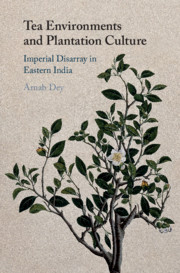Crossref Citations
This Book has been
cited by the following publications. This list is generated based on data provided by Crossref.
Besky, Sarah
2020.
Empire and indigestion: Materializing tannins in the Indian tea industry.
Social Studies of Science,
Vol. 50,
Issue. 3,
p.
398.
Besky, Sarah
2021.
The Plantation's Outsides: The Work of Settlement in Kalimpong, India.
Comparative Studies in Society and History,
Vol. 63,
Issue. 2,
p.
433.
Bharadwaj, Jahnu
2021.
Coolies, tea plantations and the limits of physical violence in colonial Assam: A historiographical note.
Asian Ethnicity,
Vol. 22,
Issue. 4,
p.
542.
Suwirmayanti, Ni Luh Gede Pivin
Diaz, Ricky Aurelius Nurtanto
Aryanto, I Komang Agus Ady
Pradipta, Gede Angga
and
Prasada, Ida Bagus Maha Indra
2022.
Development of Papaya Plant Automation Systems with the Internet of Things Concept Using Fuzzy Logic.
p.
1.
Sharma, Nabanita
2022.
The political economy of the early-colonial Brahmaputra valley, circa 1820–1830.
Asian Ethnicity,
Vol. 23,
Issue. 1,
p.
108.
Borkotoky, Namrata
2023.
Shifting Narratives of Soil in Scientific Discourses of Colonial Assam Tea Plantations.
Indian Historical Review,
Vol. 50,
Issue. 1,
p.
129.
Barua, Maan
2023.
Plantationocene: A Vegetal Geography.
Annals of the American Association of Geographers,
Vol. 113,
Issue. 1,
p.
13.
Chattopadhyaya, Utathya
2023.
Bodies That Cohere: Notes on Ganja and Gender in Colonial India.
Indian Journal of Gender Studies,
Vol. 30,
Issue. 1,
p.
55.
Holmes, Matthew
2023.
A plague of weasels and ticks: animal introduction, ecological disaster, and the balance of nature in Jamaica, 1870–1900.
The British Journal for the History of Science,
Vol. 56,
Issue. 3,
p.
391.
Das, Bikash
2023.
Hundred Years of Chargola Exodus: Changes and Continuity in the Tea Plantations in Eastern India.
Contemporary Voice of Dalit,
p.
2455328X2311696.
Holmes, Matthew
2023.
A Parochial Approach: Colonial Entomology on the Plantations of Nineteenth-Century Sri Lanka.
Itinerario,
Vol. 47,
Issue. 2,
p.
203.
Majumdar, Aparajita
2024.
Recalcitrant Lifeworlds.
Environmental Humanities,
Vol. 16,
Issue. 1,
p.
79.





